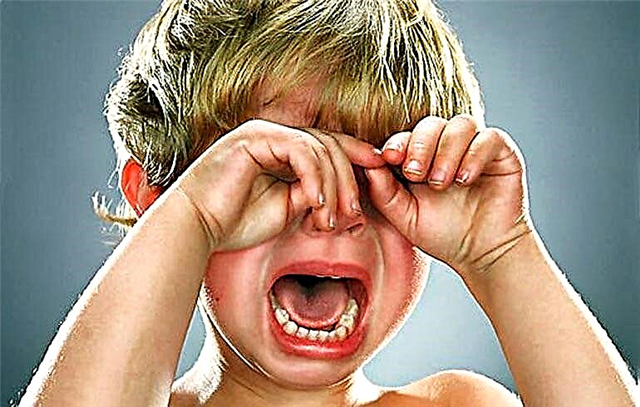Childhood Tantrums: Two types of tantrums in your child that you need to be able to distinguish. What is the difference and why is it important to distinguish them.
Every parent was faced with this unpleasant phenomenon - childish hysteria. Someone prefers to ignore children's whims, others begin to get irritated and loudly scold the screaming child. But child psychologists ask parents to be careful: there are two types of child tantrums, each of which requires a radically different parental response. And it is important to be able to distinguish between them.

Upper Brain Tantrum (Upper Floor)
This type of childish tantrum is generated by momentary emotions, strong discontent or a desire to get what is right away. In other words, this is the very unpleasant situation when your child suddenly gets up in the middle of the store, screaming and stamping his feet, insistently demanding to buy him a new doll or radio-controlled car. This tantrum is a banal attempt to manipulate a parent in order to get what he wants. It arises in the upper part of the brain and is completely controlled by the child himself.
We read in detail: baby tantrum in the store - how to react to parents

In such a hysteria, the child completely controls himself, is well aware of what is happening around him, because the cause of the hysteria on the upper floor is his own decision to arrange it. Even if it does not seem to the parent from the outside, but in this situation his child is completely adequate. This is easy to check: buy your child the desired toy, and in a split second he will become calm again, and his mood will return to full norm.
The hysteria of the top floor is a kind of moral terrorism, for which there are only two ways to resolve:
- Agree and give the child what he requires.
- Ignore the hysteria so that the child understands that his performance has no audience.
Psychologists advise to be calm about childish tantrums of this kind. Keep your composure, stay cool. Do not follow the child's lead so that he does not use such a "dirty trick" in the future to easily and unconditionally achieve his goals. In a calm tone, explain to him that at the moment you cannot fulfill his desire. Give good reasons, tell us why you refuse, for example, to buy a new typewriter. The child must learn that there is currently no banal opportunity for the realization of his momentary desire. And that you don't just refuse him to insist on your own.
The child will almost certainly calm down quickly if you do the following:
- Explain to him that you perfectly understand his wishes.
- Give reasonable reasons for rejection.
- Highlight the abnormal behavior and promise appropriate punishment.
- Offer a deal: You will buy your child a car or a doll as soon as possible.
“This doll is really very beautiful and I understand perfectly why you want her so much. But now we have absolutely no extra money, we cannot buy it today. You behave very ugly, I am ashamed of you. If you don’t calm down, then I will have to punish you, and then this weekend you will not go to the circus. If you calm down and realize that you are behaving awfully now, then we will buy you a doll as soon as we have money for it. ”
If your child, despite all your logical arguments and a calm tone, continues to rage and demand his own, then be sure to fulfill the promised punishment. And convey to him the important idea that now he will never get what he wants. And this is entirely his fault!
The child must realize that not all of his desires are obliged to instantly come true, but if he is patient and learns to behave appropriately, then in the end he will get what he wants so much.
Lower Brain Tantrum (Lower Floor)
Unlike hysterics of the first type, downstairs hysteria is a phenomenon generated by the child's temporary inadequacy. Strong negative emotions or experiences overwhelm him so much that he loses the ability to think sensibly or impute parental words. This type of tantrum engulfs the lower brain, completely blocks the ability to self-control and blocks access to the upper brain.
Children's tantrum downstairs is reminiscent of a state of passion, when the upper part of the brain is simply turned off and the thought process is blocked. At these moments, the child's brain functions in a completely different way, and any of your words simply will not reach his consciousness. The only way to stop this type of tantrum is to relieve mental stress so that the child can recover faster.
It is useless to scold the child, to shame him or to scream during the hysterics of the lower floor! The child will still not be able to understand you.
It is important to help the child get out of the state of real hysteria so that he cannot injure himself or cause serious harm to anyone (anything). Remember that the child is now completely inadequate! You can't ignore his condition, leave him alone in the room, or leave with a detached look.

When any sound arguments and logic are powerless, then act in a fundamentally different way:
- Take the child in your arms, hold him tightly to you;
- Quietly and kindly address him, convince your child that everything is fine now;
- It is better to take the child away from the place where he had an attack of hysteria;
- Calm him down tactilely: gentle strokes and gentle hugs are often very effective.
The first priority is the need to return the child to a state of healthy adequacy. And only after he has completely come to his senses, it is already possible to begin to conduct a calm dialogue. Do not shame the child and do not try to scold him, because the tantrum may recur. The task of the parents is to find out the reasons for the outbreak of hysteria.
A child who is overcome by the hysterics of the lower floor first of all needs comfort and parental care!
“You were so reluctant to finish your lunch? Didn't you like the porridge so much? Or were you already full and did not want to finish? You don't need to be so upset, you could just say that you already had enough. Let you talk to me and dad when you no longer feel like eating, and we will not force you. Okay, did we agree? "
The parent must understand that there is a significant difference between when a child is hysterical because of his whims and when he is seriously depressed and upset. It is difficult for an adult to condescend to the level of his child. But sometimes a small child can really get very upset because of an insignificant incident or a little thing, even fall into a state of bitter melancholy. After the child calms down and his upper part of the brain can function normally, the parent should try to calmly talk with the child, call for a response dialogue, urging the child to reason logically.
“Even if the food didn’t seem very tasty to you, or if you’re already full, you should not behave this way. This is very ugly! After all, I tried and cooked for you. You could just say you're not hungry, I wouldn't force you to eat. You can't lose your temper if you just didn't like something. ”
It is at this moment, when the child was previously understood by you, received his share of consolation and sympathy, you can take gentle educational measures. The upper part of the brain is no longer blocked, the tantrum is behind, and the child becomes receptive to your words and instructions.
How to quickly recognize the correct type of tantrum
Not every parent has the skills of a subtle psychologist, so sometimes it is very difficult to determine the type of child hysteria that unfolded before the eyes. And there are difficulties with the choice of their own response. But hysterics can be distinguished by a number of nuances.
False hysteria:
- You notice that the crying child listens and understands you;
- The child quickly calms down after threats of punishment;
- The child can be distracted or talked, switch his attention;
- It turns out to come to an agreement with the child;
- The hysteria is more demonstrative.
True hysteria:
- The child does not understand your words, as if he does not hear you;
- He does not calm down even after you have promised to fulfill his desire;
- The child is trying to harm you or himself, seeks to break something, hit someone;
- He cannot control his body, and if there is speech, then it is incoherent;
- Hysteria resembles a state of passion.
Remember: sometimes even an adult has a hard time coping with his emotions, but for a small child this is often completely impossible.
How to find out the reasons for hysterics and be able to instantly prevent them?
All parents are periodically faced with the problem of children's tantrums - tears, screams, fumbling on the floor in public places confuse moms and dads. So that your life does not turn into a continuous nightmare, and your child ceases to achieve his goal with the help of tears, psychologist Victoria Lyuborevich-Torkhova talks about effective methods of dealing with child tantrums:



